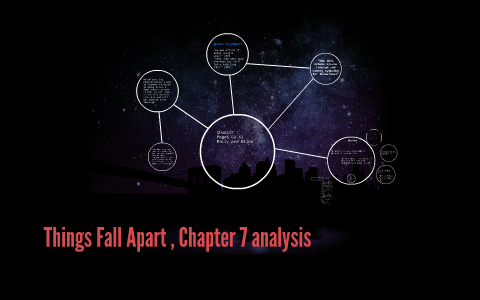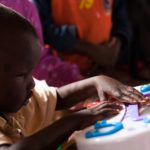The seventh chapter of Things Fall Apart reveals the fate of Ikemefuna, and the personalities of Okonkwo and Nwoye.
In the three years, Ikemefuna has stayed with Okonkwo’s family Nwoye has come to see Ikemefuna as an elder brother and has learnt to act in a more stereotypically masculine manner. Of course, this pleases Okonkwo and endears him even closer to Ikemefuna.
Then the crisis comes when Ogbuefi Ezeudu visits Okonkwo in order to make inform him about the Oracle’s decision: “Ikemefuna must be sacrificed”, while personally advising him not to involve himself in the killing since the boy calls him father. Yet Okonkwo could not restrain his show of strength. When the chosen clansmen takes Ikemefuna out of the village to commit the sacrifice and strike him once, he’d run to Okonkwo for help only to be finished by the one he called “father”
Although Ikemefuna is a victim of fate, Okonkwo is responsible for contributing to the web. Nwoye in his part begins to detach himself from tradition of the land. Indeed, the death of Ikemefuna was perhaps the beginning of Okonkwo’s downfall.
Exegesis:
Achebe’s use of “locust” plays a symbolic- a foreshadow of the oncoming “visitors” who will bear bitter-sweet gifts.
According to Sparknotes:
https://www.sparknotes.com/lit/things/symbols/
Achebe depicts the locusts that descend upon the village in highly allegorical terms that prefigure the arrival of the white settlers, who will feast on and exploit the resources of the Igbo. The fact that the Igbo eat these locusts highlights how innocuous they take them to be. Similarly, those who convert to Christianity fail to realize the damage that the culture of the colonizer does to the culture of the colonized.
The language that Achebe uses to describe the locusts indicates their symbolic status. The repetition of words like “settled” and “every” emphasizes the suddenly ubiquitous presence of these insects and hints at the way in which the arrival of the white settlers takes the Igbo off guard. Furthermore, the locusts are so heavy they break the tree branches, which symbolizes the fracturing of Igbo traditions and culture under the onslaught of colonialism and white settlement. Perhaps the most explicit clue that the locusts symbolize the colonists is Obierika’s comment in Chapter 15: “the Oracle . . . said that other white men were on their way. They were locusts. . . .”
Luck, chance and work: It also seems Achebe has not resolved his conflict of luck and hardwork. At the beginning, we think Okonkwo has his destiny in his hands, but now it seems his chi has turned his back on him




